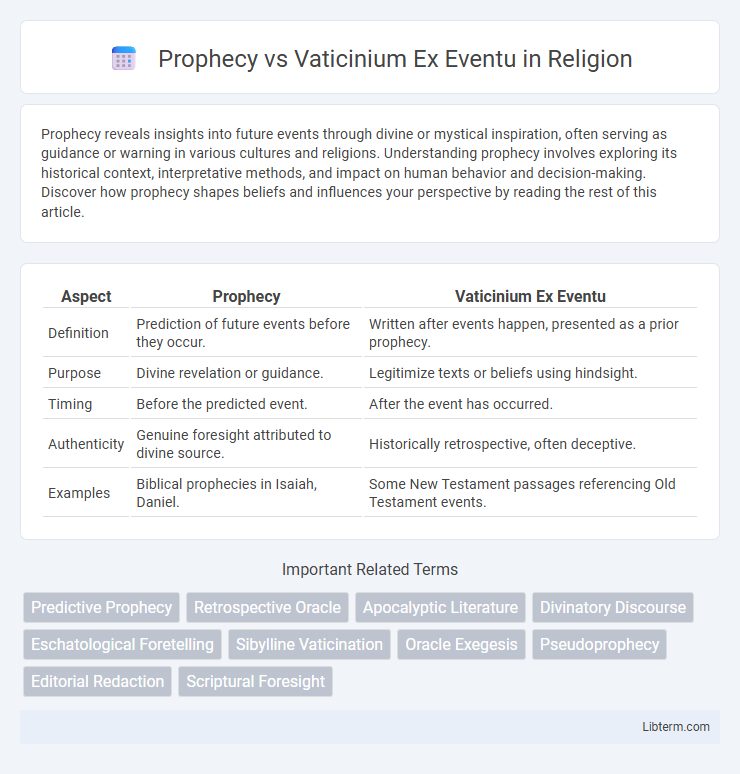Prophecy reveals insights into future events through divine or mystical inspiration, often serving as guidance or warning in various cultures and religions. Understanding prophecy involves exploring its historical context, interpretative methods, and impact on human behavior and decision-making. Discover how prophecy shapes beliefs and influences your perspective by reading the rest of this article.
Table of Comparison
| Aspect | Prophecy | Vaticinium Ex Eventu |
|---|---|---|
| Definition | Prediction of future events before they occur. | Written after events happen, presented as a prior prophecy. |
| Purpose | Divine revelation or guidance. | Legitimize texts or beliefs using hindsight. |
| Timing | Before the predicted event. | After the event has occurred. |
| Authenticity | Genuine foresight attributed to divine source. | Historically retrospective, often deceptive. |
| Examples | Biblical prophecies in Isaiah, Daniel. | Some New Testament passages referencing Old Testament events. |
Understanding Prophecy: Definition and Origins
Prophecy refers to a prediction or revelation about future events, often believed to be divinely inspired and found in religious texts such as the Bible or the Quran. Vaticinium Ex Eventu, in contrast, is a literary technique where purported prophecies are written after the event has occurred, creating the illusion of foresight. Understanding the definition and origins of prophecy involves examining its historical role in shaping cultural beliefs and distinguishing genuine forecasts from post-event writings.
Vaticinium Ex Eventu: Meaning and Historical Context
Vaticinium Ex Eventu refers to prophecies written after the events they predict, often crafted to appear as genuine predictions. This technique was common in ancient texts, allowing authors to legitimize their works by aligning them with historical happenings. Recognizing Vaticinium Ex Eventu is crucial for historians and scholars to distinguish authentic prophecy from retrospective narrative construction.
Key Differences Between Prophecy and Vaticinium Ex Eventu
Prophecy involves a genuine prediction made before an event occurs, reflecting foreknowledge or divine insight, whereas Vaticinium Ex Eventu refers to a prophecy written after the event to appear predictive. Key differences include the timing of composition, the intent behind the message, and the evidence of authenticity; prophecy is often supported by verifiable foretelling, while Vaticinium Ex Eventu relies on retrospective interpretation and lacks independent verification prior to the event. Understanding these distinctions is crucial for evaluating historical texts, religious claims, or literary works that feature predicted outcomes.
Literary Techniques in Ancient Texts
Prophecy in ancient texts often employs foreshadowing and symbolic language to convey future events, creating anticipation and thematic depth, whereas Vaticinium Ex Eventu utilizes retrospection and anachronism to frame historical occurrences as foretold, enhancing narrative authority and legitimacy. Literary techniques such as allegory, metaphor, and dramatic irony differentiate these concepts by their temporal orientation and purpose within the text. Understanding these techniques reveals how ancient authors manipulated narrative structures to influence audience perception and validate cultural or religious beliefs.
Identifying Prophecy in Religious Scriptures
Identifying prophecy in religious scriptures involves distinguishing genuine foretelling of future events from vaticinium ex eventu, where texts are written after events have occurred to appear predictive. Genuine prophecies often contain detailed, specific elements that were unlikely to be known by the authors at the time of writing, supported by historical context and corroborative evidence. Scholarly analysis employs linguistic, historical, and textual criticism to evaluate the authenticity of these prophetic statements within various religious traditions.
Vaticinium Ex Eventu in Historical Writings
Vaticinium ex eventu refers to a literary technique where events are described as if predicted but are actually written after the outcomes are known, commonly found in historical writings. This method serves to legitimize narratives by presenting past events as foreseen prophecies, often enhancing the authority of the text or its author. Scholars analyze such texts to distinguish genuine prophetic claims from retrospectives shaped by historical context and authorial intent.
Purposes and Functions of Prophecy
Prophecy serves the purpose of revealing divine will, providing guidance, and offering hope about future events or moral truths, often aiming to influence present behavior. Vaticinium ex eventu functions as historical narrative written after events, disguised as prophecy to legitimize texts or reinforce faith. The key distinction lies in prophecy's role as a motivational and ethical tool, while vaticinium ex eventu primarily serves apologetic or editorial purposes.
Motivations Behind Vaticinium Ex Eventu Narratives
Vaticinium ex eventu narratives often arise from motivations to legitimize political authority or religious doctrines by retroactively predicting past events. Authors use these post-event prophecies as tools to reinforce ideological agendas, enhance credibility, or unify followers under a shared historical interpretation. These narratives strategically rewrite history to create an illusion of foresight, influencing perceptions of legitimacy and divine sanction.
Examples of Prophecy vs Vaticinium Ex Eventu
Prophecy involves predictions made before events occur, exemplified by biblical prophecies such as Isaiah foretelling the coming of the Messiah. In contrast, Vaticinium Ex Eventu refers to supposed prophecies written after events have already happened, like the Gospel writers describing Jesus' life with hindsight. These two concepts differ fundamentally in timing and authenticity, with Prophecy aiming at genuine foresight and Vaticinium Ex Eventu serving as retrospective interpretation.
Interpreting Ancient Predictions: Scholarly Perspectives
Scholars distinguish prophecy from vaticinium ex eventu by analyzing the historical context and language of ancient texts, identifying whether predictions were made before or after the events occurred. Prophecy involves genuine foreknowledge, often rooted in religious or cultural beliefs, whereas vaticinium ex eventu refers to retroactive writings that present past events as foretold to legitimize authority or ideology. Critical methodologies, including textual criticism and comparative analysis, serve to uncover the origins and intent behind ancient predictions, informing our understanding of their authenticity and purpose.
Prophecy Infographic

 libterm.com
libterm.com